九年级英语 Unit 3《Teenagers should be allowed to choose their own clothes》同步练习2 人教新目标版
人教版九年级英语unit3知识点,单词讲解
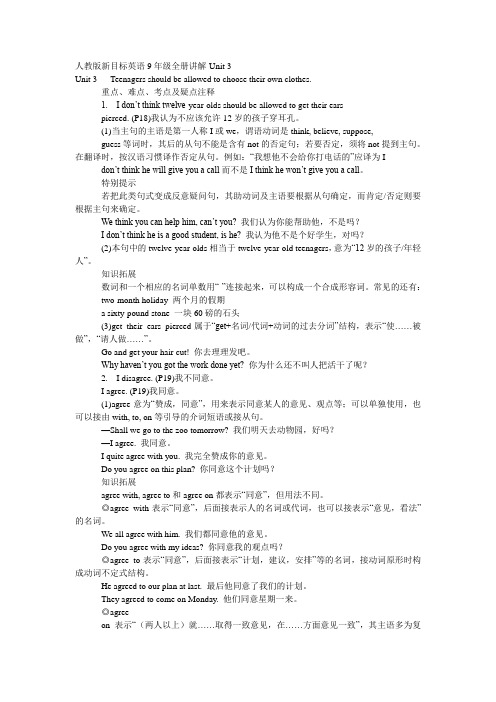
人教版新目标英语9年级全册讲解-Unit 3Unit 3 Teenagers should be allowed to choose their own clothes.重点、难点、考点及疑点注释1. I don’t think twelve-year-olds should be allowed to get their earspierced. (P18)我认为不应该允许12岁的孩子穿耳孔。
(1)当主句的主语是第一人称I或we,谓语动词是think, believe, suppose,guess等词时,其后的从句不能是含有not的否定句;若要否定,须将not提到主句。
在翻译时,按汉语习惯译作否定从句。
例如:“我想他不会给你打电话的”应译为I don’t think he will give you a call而不是I think he won’t give you a call。
特别提示若把此类句式变成反意疑问句,其助动词及主语要根据从句确定,而肯定/否定则要根据主句来确定。
We think you can help him, can’t you? 我们认为你能帮助他,不是吗?I don’t think he is a good student, is he? 我认为他不是个好学生,对吗?(2)本句中的twelve-year-olds相当于twelve-year-old teenagers,意为“12岁的孩子/年轻人”。
知识拓展数词和一个相应的名词单数用“-”连接起来,可以构成一个合成形容词。
常见的还有:two-month holiday 两个月的假期a sixty-pound stone 一块60磅的石头(3)get their ears pierced属于“get+名词/代词+动词的过去分词”结构,表示“使……被做”,“请人做……”。
Go and get your hair cut! 你去理理发吧。
九年级上册单词巧记 句型语法剖析(Unit 3 Teenagers should be allowed to c
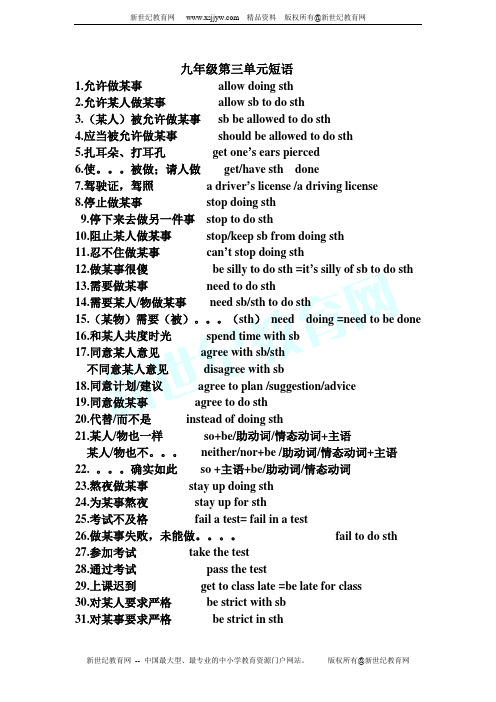
九年级第三单元短语1.允许做某事allow doing sth2.允许某人做某事allow sb to do sth3.(某人)被允许做某事sb be allowed to do sth4.应当被允许做某事should be allowed to do sth5.扎耳朵、打耳孔get one’s ears pierced6.使。
被做;请人做get/have sth done7.驾驶证,驾照 a driver’s license /a driving license8.停止做某事stop doing sth9.停下来去做另一件事stop to do sth10.阻止某人做某事stop/keep sb from doing sth11.忍不住做某事can’t stop doing sth12.做某事很傻be silly to do sth =it’s silly of sb to do sth13.需要做某事need to do sth14.需要某人/物做某事need sb/sth to do sth15.(某物)需要(被)。
(sth)need doing =need to be done16.和某人共度时光spend time with sb17.同意某人意见agree with sb/sth不同意某人意见disagree with sb18.同意计划/建议agree to plan /suggestion/advice19.同意做某事agree to do sth20.代替/而不是instead of doing sth21.某人/物也一样so+be/助动词/情态动词+主语某人/物也不。
neither/nor+be /助动词/情态动词+主语22. 。
确实如此so +主语+be/助动词/情态动词23.熬夜做某事stay up doing sth24.为某事熬夜stay up for sth25.考试不及格fail a test= fail in a test26.做某事失败,未能做。
Unit_3_Teenagers_should_be_allowed_to_choose_their_own_clothes
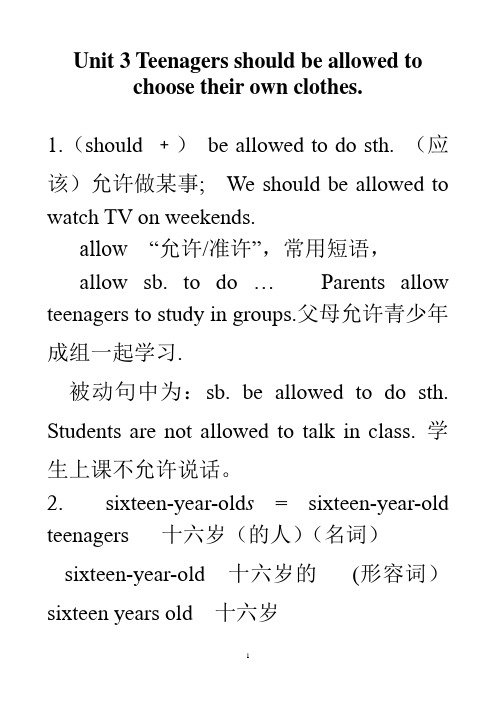
Unit 3 Teenagers should be allowed tochoose their own clothes.1.(should ﹢)be allowed to do sth. (应该)允许做某事; We should be allowed to watch TV on weekends.allow “允许/准许”,常用短语,allow sb. to do …Parents allow teenagers to study in groups.父母允许青少年成组一起学习.被动句中为:sb. be allowed to do sth. Students are not allowed to talk in class. 学生上课不允许说话。
2. sixteen-year-old s= sixteen-year-old teenagers 十六岁(的人)(名词)sixteen-year-old十六岁的(形容词)sixteen years old 十六岁The boy is five years old. = He is a five-year-old boy.3.o wn pron. & adj. 自己的I have my own bedroom.v. 拥有,占有This book is mine. I own it.owner n. 物主,主人Who is the owner of the house.4.(足)够…… enough +名词enough people/water/time/money形容词/副词+enough big/tall/serious enough5. stop to do…停下来去干……He stops to have a rest.stop doing… 停止(不准)干……Please stop talking.stop sb. from doing sth. 阻止某人做某事5. He doesn‟t seem to have many friends.= It seems that he doesn‟t have manyfriends. 他看起来没有很多朋友.6. He needs time to do homework. 他需要时间做作业. need (sth.) to do sth. They need money to buy food.need sth. We all need air and water.sth.doing sth. The bike needs repairing. = The bike needs to be repaired. (主动表被动)7. They talk instead of doing homework. = They don‟t do homework. They talk. 他们谈话,没有做作业.instead of +名词/代词They go to the movies instead of their parents.+动名词(doing) He sang a song instead of telling a story.8. a lot of =lots of 许(很)多/大量的(可/不可数名词)many(可数名词)much (不可数名词)9. So do we. 我们家也是(有). He runs so fast. So does his brother.1) 用副词too 多用于口语,句末, 肯定句/问句.either多用于口语,句末, 否定句表“……也一样”also 多用正式文体, 句中近动词, 各句型.2)用倒装陈述部分肯定用“so+谓动+ 主语”陈述部分否定用“nor/neither+谓动+主语”注意:so+主语+助动词/情态动词/系动词be”,表示赞同某人的看法,意为“是啊,确实如此”--- Lily sings well. --- So she does. ---Lily唱得好。
九年级英语全册《Unit 3 Teenagers should be allowed to choo
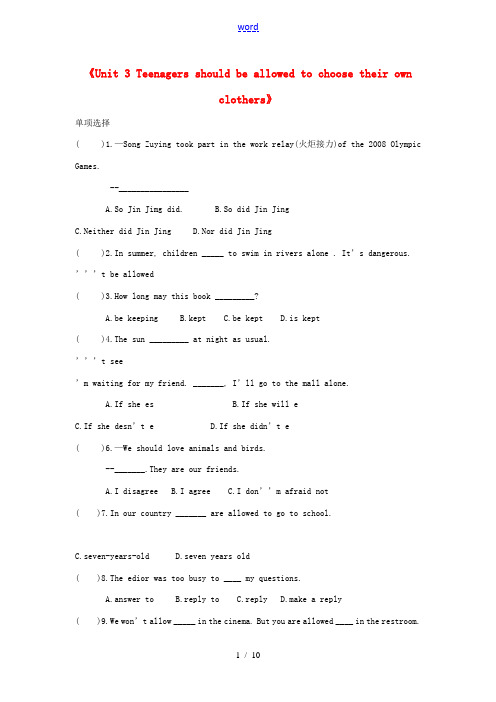
《Unit 3 Teenagers should be allowed to choose their ownclothers》单项选择( )1.—Song Zuying took part in the work relay(火炬接力)of the 2008 Olympic Games.--________________A.So Jin Jimg did.B.So did Jin JingC.Neither did Jin JingD.Nor did Jin Jing( )2.In summer, children _____ to swim in rivers alone . It’s dangerous. ’’’t be allowed( )3.How long may this book _________?A.be keepingB.keptC.be keptD.is kept( )4.The sun _________ at night as usual.’’’t see’m waiting for my friend. _______, I’ll go to the mall alone.A.If she esB.If she will eC.If she desn’t eD.If she didn’t e( )6.—We should love animals and birds.--_______.They are our friends.A.I disagreeB.I agreeC.I don’’m afraid not( )7.In our country _______ are allowed to go to school.C.seven-years-oldD.seven years old( )8.The edior was too busy to ____ my questions.A.answer toB.reply toC.replyD.make a reply( )9.We won’t allow _____ in the cinema. But you are allowed ____ in the restroom.A.smoke; smokingB.to smoke ; to smokeC.smoking; to smokeD.to smoke; smoking’t _____ too late, or you’ll feel tired in tomorrow’s classes.A.wake upB.stay upC.get upD.give up( )11.—I used to go out for a walk after supper.--_______________.A.So do IB.So did IC.So can ID.So am I.( )12.—What should we do first if we want to develop our village ?--A lot of new roads_____, I think.A.have to buildB.must buildC.must be builtD.have built( )13.I must get my breakfast ______ now.’t worry . He is _____ to look after little Betty.A.carefully enoughB.enough carefulC.careful enoughD.enough carefully( )15.What did you use to do ______ my age ?A.atB.inC.withD.to二.完形填空After the Second World War, there were many reports of mysterious(神秘的)“flying saucers(碟子)”.They 1 throughout the world.For quite a long time strange shapes had been reported in 2 parts of the world,but it was not until recent times that these were seriously studied . Pictures and films 3 of flying saucers, or UFOs seen in the sky . Some pilots of 4 reported that round flying machines had flollowd 5 , and moved at great speeds. Some unofficial (非官方的)experts and 6 suggested that some creatures(生物)from other planets were watching us. Some reports said a UFO had 7 the earth. A space creature 8 the UFO and moved around , then flew of again. But none of the landings was ever proved(被证实) to be true.What lies ahead of us (我们的前景如何)?We do not know. 9 we can be sure that whatever happens, we are living in an age which will grow streadily(稳定地) 10 .( )3.A.take B.took C.were taking D.were taken( )4.A.planes( )7.A.was B.left C.arrived nded on( )9.A.And B.But C.Or D.So( )10.A.interesting B.interested C.more interesting D.more interested 三.阅读理解A:Who Influences Teenagers?“Teenager” means people from 13 to 19 years old. Although they’re young, they have to make many important choices by themselves. They need to think about questions like these.Should I go to college ? What kind of jobs do I want ? However, other people also influence their choices . Who influences Teenagers ? Teenagers were asked this question and here’s what they said.It depends on the kind of choice . When teenagers buy things , friends are the most important influence. This is especially true for clothes and music. TV shows, advertiserments(广告)and parents also influence teenagers. In more serious things, parents are probably the most important influence. Some teenagers say it’s best to regard both parents and friends as influences. James, a seventeen-year-old boy says he’s “Just a crazy man”. He also says , “Parents are really important because they can tell you what’s right and wrong.”But teenagers also feel they need to make choices to make their own mistakes.As one teenage girl said, “If our parents don’t let us make our own choices, maybe in the future we won’t know how to do it .” And they feel friends can often be a big help, especially because friends sometimes know more about their situation(处境)than their parents do.Do you depend parents or others when you decide what to do and how to do it ? whoever(无论谁)you depend on ,the correct choice is the most important. Your future is in your hand.根据短文内容,判断正(T)误(F)( )1.When teenagers buy clothes and music, friends are the most important influence.( )2.People from 13 to 19 can be called “teenagers”.( ) shows and advertisements can’t influence teenagers.( )4.Sometimes friends know more about teenagers’situation than their parents.( )5.In more serious things , friends are probably the most important influence. BA DiscussionHost: Hello! I’m Gavin from All Talk 970FM.Wele to our program. Today our topic is part-time jobs. Are they good for school children or not?Headmaster(校长):Certainly not. Children have got two full-time jobs already: growing up and going to school. Part-time jobs make them so tired that they fall asleep in class.Mrs Smith: I agree. I know school hours are short, but there’s homework too. And children need a lot of stay at school until they’re eighteen or nineteen. A part-time job can’t harm(伤害)them. In fact, it’s good for them. They themselves make their pocket money . And they see something of the world outside school.Business man:You’re quite right. Boys learn a lot from a part-time job.And wemustn’t forget that some families need the extra(额外的)money. If the students don’t take part-time jobs , they can’t stay at school.Host: Well, we have got two for , and two agaist . What do our listeners think ? ( )1.How many guests join the discussion ?( )2.Who have the same idea ?A.Mr and Mrs Smith .B.The host and Mrs Smith.C.the headmaster and businessmanD.The businessman and Mr Smith( )3.Mrs Smith thinks that children ________.A.need enough sleepB.need the extra moneyC.should see something of the World outside schoolD.should stay at school until they’re eighteen or nineteen( )4.What do the children think of part-time jobs ?A.We are not told in this passageB.Part-time jobs are good for themC.Part-time jobs aren’t good for their studies.D.Part-time jobs can help the students from poor families.( )5.Where is the discussion most probably from ?A.A TV stationB.A radio stationC.A newspaperD.A magazzine.CStrong Man Swimming Club Rules1.All swimmers must take a shower before they go into the pool.2.Diving is only allowed from the diving-board.3.Running and playing near the pool is not allowed.4.Club members may bring guests at the weekends only.5.Children under 12 are not allowed to use the pool unless they are with an adult.6.Members must show their membership cards at the front reception desk.ed towels must be placed in the bins provided.8.Smoking is not allowed in the changing-room.9.Guests must sign at the front reception desk.10.Only club members and their families are allowed to use the pool.( )1.Diving is allowed from _____A.everywhereB.right side of the poolC.the diving-boardD.the gate ( )2.When are guests allowed to e ?A.FridayB.SaturdayC.Any dayD.After 6:00 pm.( )3.What must club members bring with them ?A.Towels.B.Keys.C.Swimming caps.D.Membership cards.( )4.If club members bring guests there, what should the guests do ?A.NothingB.Bring ID cardsC.Sing at the front desk( )5.Who are allowed to use the pool?A.AnyoneB.Onlyclub membersC.Only guestsD.Club members and their familiesDIn a classroom in any countries, the teacher teaches more than art or history language. He or she teachers something behind the culture(文化)of the country. In a country such as the United States, people with different histories, cultures and languages join together and they pay much attention to personal ideas. Teachers try to make each student special. Students do not have to remember a lot of information, instead, they work and find answers by themselves. There is often discussion in the classroom.At an early age students learn to have their own ideas. Their education encourages personal thought(思想).The important is placed on how to arrive at an answer and not only to get the correct answer.In most Asian countries, people have the same language, history and culture. Perhaps for this reason, the education there pays more attention to group goals than personal ideas. Children in China and Japan often work together and help each otheron homework. In the classroom, the ways of teaching are often very traditional. The teacher says , and the students listen. There is not much discussion. Instead, the students repeat(重复)rules or information that they have been taught in order to keep than in mind.In many ways there differences e from different educational ideas. In Western countries teachers are taught students to learn by themselves. In some Asian countries, however, teachers often feel that their job is to pass knowledge to students.回答问题1.Do students in the United States have to remember a lot of information ?2.There is often discussion in the classroom in America , isn’t there ?3.What does the education in the United States encourage ?4.Which does the education is some Asian countries pay more attention to , group goals or personal ideas ?5.Put the sentence “In some Asian countries, however, teachers often feel that their job is to pass knowledge to students.”into Chinese.四.词语运用。
九年级上英语 unit 3 Teenagers should be allowed to choose their own clothes.
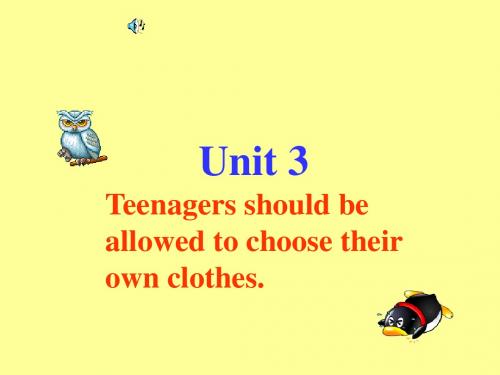
3. Students should not be allowed to go out at night.
4. Students should not be allowed to take part-time jobs .
3. Students should not be allowed to get their ears pierced.
一般现在时: am/is/ are +动词的过去分词 一般过去时: was/were +动词的过去分词
seem 似乎是,好象是 It seems/seemed that +从句 It seems that he is very lonely. He seems to be lonely. It seems that they are friends.
Tony didn’t , either.
neither did Tony.
He wasn’t a doctor , they were not ,either. neither were they.
Tim works hard, so he does. She is a doctor, so she is. He can play the guitar, so she can. So表示强调,主语确实如此。
My sister washed the clothes。 The clothes were washed by my sister. The teacher asked him to the office。 He was asked by the teacher to the office.
My parents allow me to watch TV. I am allowed to watch TV by my parents. He does his homework every day. His homework is done by him every day.
九年级Unit 3 Teenagers should be allowed to choose their own clothes.的语法知识点
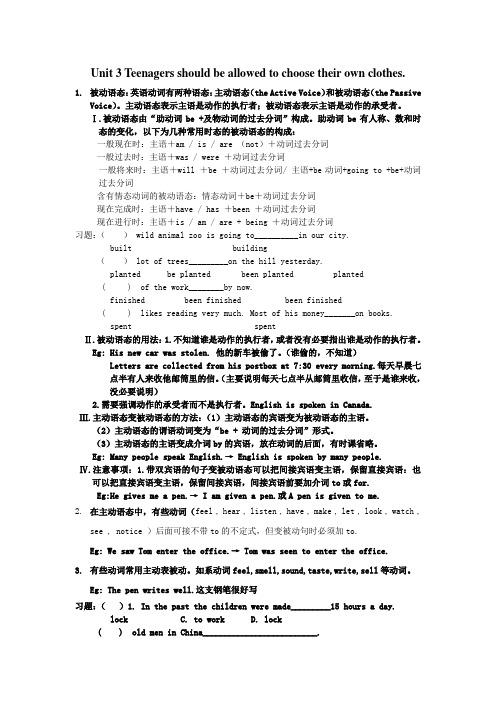
Unit 3 Teenagers should be allowed to choose their own clothes.1.被动语态:英语动词有两种语态:主动语态(the Active Voice)和被动语态(the PassiveVoice)。
主动语态表示主语是动作的执行者;被动语态表示主语是动作的承受者。
Ⅰ.被动语态由“助动词be +及物动词的过去分词”构成。
助动词be有人称、数和时态的变化,以下为几种常用时态的被动语态的构成:一般现在时:主语+am / is / are (not)+动词过去分词一般过去时:主语+was / were +动词过去分词一般将来时:主语+will +be +动词过去分词/ 主语+be动词+going to +be+动词过去分词含有情态动词的被动语态:情态动词+be+动词过去分词现在完成时:主语+have / has +been +动词过去分词现在进行时:主语+is / am / are + being +动词过去分词习题:() wild animal zoo is going to__________in our city.built building() lot of trees_________on the hill yesterday.planted be planted been planted planted( ) of the work________by now.finished been finished been finished( ) likes reading very much. Most of his money_______on books.spent spentⅡ.被动语态的用法:1.不知道谁是动作的执行者,或者没有必要指出谁是动作的执行者。
Eg: His new car was stolen. 他的新车被偷了。
(谁偷的,不知道)Letters are collected from his postbox at 7:30 every morning.每天早晨七点半有人来收他邮筒里的信。
九年级英语 Unit 3 Teenagers should be allowed to choose their own clothes. 讲解与练习

第 1 页 (共4 页) 第 2 页 (共4 页)学校 姓名 班级 考场 考号---------------------------------○密------------------ -------------------○封----------------------------- -- --○线----------------------------※※※※※※※※※※※※※※※答※※※※※※※※※※※※※※※※※※题※※※※※※※※※※※※※※※※线※※※※※※※※※※※※※九年级英语 Unit 3: Teenagers should be allowed tochoose their own clothes. 讲解与练习重点短语take the test 参加考试 pass the test 通过考试 fail a test 考试失败be strict with+人 对某人严格be strict in+事物 对某事要求严格stay up 熬夜have an opportunity to do sth.有机会做某事=have a chance to do/ of doing every other day 每隔一天 (每两天)clean up 打扫 整理learn from each other 互相学习concentrate on 专注于 one’s own 某人自己的the other day 前几天,几天前 = a few days ago= every two days at present 现在,目前 in this way 用这种方法in the way 挡道的,妨碍人的on the way 在路上 on one’s way to 在某人去…的路上 by the way 顺便说(问)be serious about 对…认真care for 在乎、关心 【语言点】1. Teenagers should be allowed to choose their own clothes.应该允许青少年选择自己的衣服。
九年级英语Unit 3 Teenagers should be allowed tochoose t
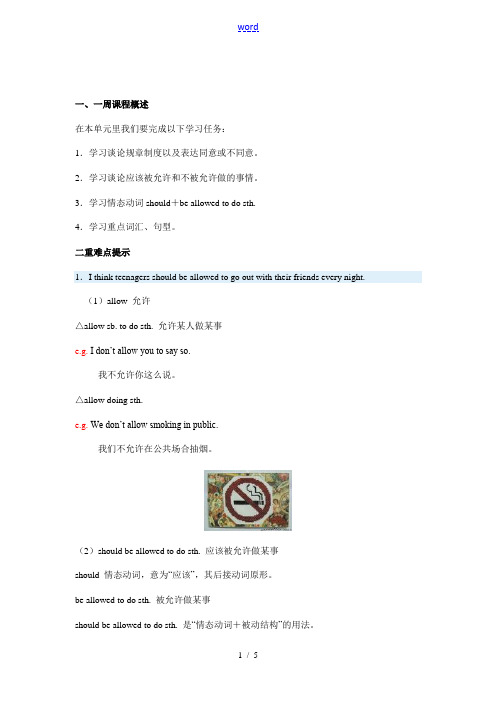
一、一周课程概述在本单元里我们要完成以下学习任务:1.学习谈论规章制度以及表达同意或不同意。
2.学习谈论应该被允许和不被允许做的事情。
3.学习情态动词should+be allowed to do sth.4.学习重点词汇、句型。
二重难点提示1.I think teenagers should be allowed to go out with their friends every night. (1)allow 允许△allow sb. to do sth. 允许某人做某事e.g.I don’t allow you to say so.我不允许你这么说。
△allow doing sth.e.g. We don’t allow smoking in public.我们不允许在公共场合抽烟。
(2)should be allowed to do sth. 应该被允许做某事should 情态动词,意为“应该”,其后接动词原形。
be allowed to do sth. 被允许做某事should be allowed to do sth. 是“情态动词+被动结构”的用法。
e.g. He is allowed to play puter games on weekends.他被允许在周末玩电脑游戏。
Children shouldn’t be allowed to go swimming alone.孩子们不应该被允许独自去游泳。
2.I don’t think twelve-year-olds should be allowed to get their ears pierced.(1)twelve-year-olds 12岁的孩子们twelve-year-olds 是复合名词,此短语相当于“twelve-year-old children”。
“twelve-year-old”是复合形容词,作定语。
如:a twelve-year-old boy 一个12岁的男孩(2)get their ears pierced 扎耳朵眼“get+名词+过去分词”意为“使……被……”。
人教版九年级英语unit3_Teenagers_should_be_allowed_to_choose_their_own_clothes
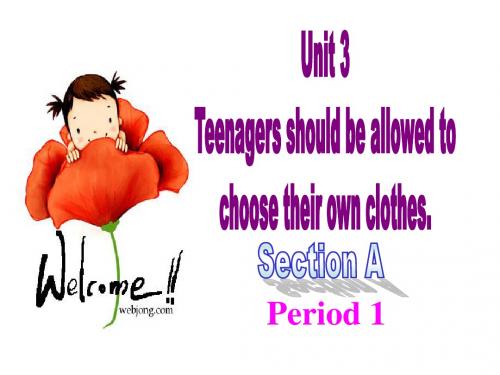
目标语言(Target Language) 1. I think sixteen-year-olds should be allowed to drive . 我认为应该允许16岁的孩子开车。 2. I disagree . I think sixteen is too young. 我不同意,我认为16岁这个年纪太年轻了。 3. Do you think thirteen-year-olds should be allowed to have part-time jobs ? 你认为应该允许13岁的孩子们做兼职工作 吗? 4. No , I don’t . 不,我认为不应该。
Period 1
Grammar
被动语态 1. ―语态”表示主语和谓语动词之间的关系。 英语中有“两态”的说法,即主动语态和被 动语态,本单元中反复出现的should be allowed 就是一个含有情态动词(should)的 被动语态。 先看几个基本概念 主语是动作的发出者为主动语态 主语是动作的接受者为被动语态 只有及物动词才有被动语态。
their own clothes.
1b
Listen and circle ―T‖ for true or ―F‖ for false..
如:We should allow teenagers to surf the Internet . -Teenagers should be allowed to surf the Internet. Can you use it ? 你会使用它吗? -Can it be used ?
They take good care of my child. -My child is taken good care of . 他们把我的孩子照顾得很好。 I turned off the radio. -The radio was turned off (by me). 附:动词短语的被动语态 take care of -be taken care of cut down -be cut down laugh at -be laughed at look after-be looked after
九年级英语第三单元知识点完整版
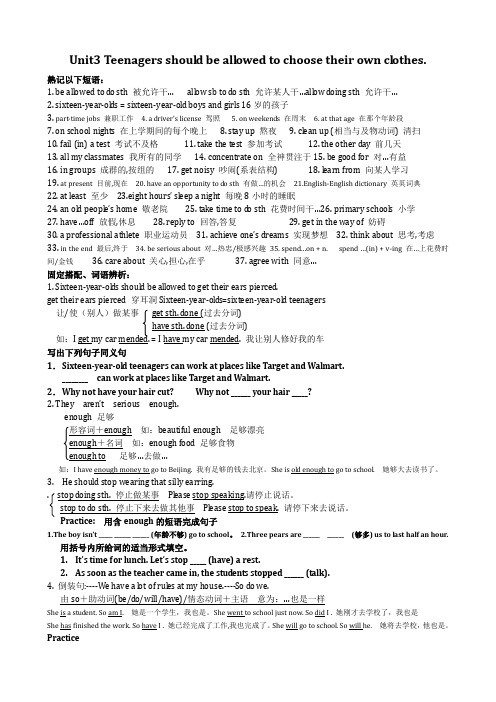
Unit3 Teenagers should be allowed to choose their own clothes.熟记以下短语:1. be all owed to d o sth 被允许干… allow sb to do sth 允许某人干…all ow doing sth 允许干…2. sixteen-year-olds = sixteen-year-ol d boys and girls 16岁的孩子3. part-time jobs 兼职工作4. a driver’s license驾照5. on weekends 在周末6. at that age 在那个年龄段7. on school nights 在上学期间的每个晚上8. stay up 熬夜9. clean up (相当与及物动词) 清扫10. fail (in) a test 考试不及格11. take the test 参加考试12. the other day 前几天13. all my classmates 我所有的同学14. concentrate on 全神贯注于15. be good for 对…有益16. in groups 成群的,按组的17. get noisy 吵闹(系表结构) 18. learn from 向某人学习19. at present 目前,现在20. have an opportunity to do sth 有做…的机会21.English-English dictionary 英英词典22. at l east 至少23.eight hours’ sl eep a night 每晚8小时的睡眠24. an ol d peopl e’s home 敬老院25. take time to do sth 花费时间干…26. primary schools 小学27. have…off 放假,休息28. reply to 回答,答复29. get in the way of 妨碍30. a professional athlete 职业运动员31. achieve one’s dreams 实现梦想32. think about 思考,考虑33. in the end 最后,终于34. be serious about 对…热忠/极感兴趣35. spend…on + n. spend …(in) + v-ing 在…上花费时间/金钱36. care about 关心,担心,在乎37. agree with 同意…固定搭配、词语辨析:1. Sixteen-year-olds shoul d be all owed to get their ears pierced.get their ears pierced 穿耳洞Sixteen-year-ol ds=sixteen-year-ol d teenagers让/使(别人)做某事get sth. d one (过去分词)have sth. done (过去分词)如:I get my car mended. = I have my car mended. 我让别人修好我的车写出下列句子同义句1.Sixteen-year-ol d teenagers can work at places like Target and Walmart.________ can work at places like Target and Walmart.2.Why not have your hair cut? Why not ______ your hair _____?2. They aren’t serious enough.enough 足够如:beautiful enough足够漂亮enough food 足够食物…去做…如:I have enough money to go to Beijing. 我有足够的钱去北京。
九年级英语全册 Unit3 Teenagers should be allowed t
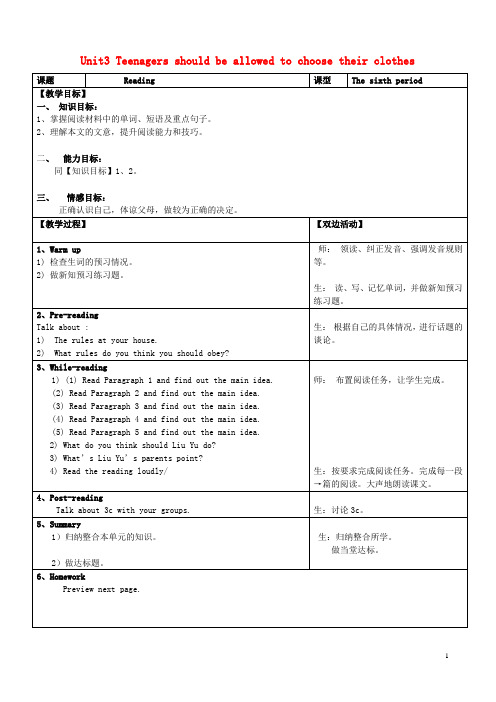
课题
Reading
课型
The sixth period
【教学目标】
一、知识目标:
1、掌握阅读材料中的单词、短语及重点句子。
2、理解本文的文意,提升阅读能力和技巧。
二、能力目标:
同【知识目标】1、2。
3) What’s Liu Yu’s parents point?
4) Read the reading loudly/
师:布置阅读任务,让学生完成。
生:按要求完成阅读任务。完成每一段→篇的阅读。大声地朗读课文。
ቤተ መጻሕፍቲ ባይዱ4、Post-reading
Talk about 3c with your groups.
(3) Read Paragraph 3 and find out the main idea.
(4) Read Paragraph 4 and find out the main idea.
(5) Read Paragraph 5 and find out the main idea.
2) What do you think should Liu Yu do?
三、情感目标:
正确认识自己,体谅父母,做较为正确的决定。
【教学过程】
【双边活动】
1、Warm up
1)检查生词的预习情况。
2)做新知预习练习题。
师:领读、纠正发音、强调发音规则等。
生:读、写、记忆单词,并做新知预习练习题。
2、Pre-reading
Talk about :
1) The rules at your house.
九年级英语全册 Unit 3 Teenagers should be allowed to choo
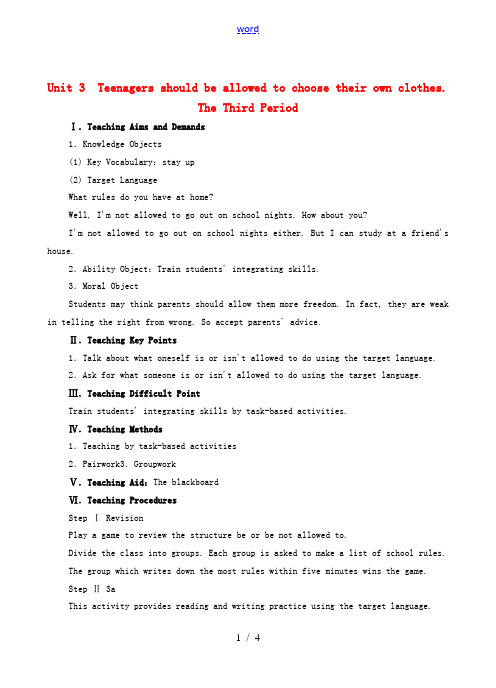
Unit 3 Teenagers should be allowed to choose their own clothes.The Third PeriodⅠ.Teaching Aims and Demands1.Knowledge Objects(1) Key Vocabulary:stay up(2) Target LanguageWhat rules do you have at home?Well, I'm not allowed to go out on school nights. How about you?I'm not allowed to go out on school nights either. But I can study at a friend's house.2.Ability Object:Train students' integrating skills.3.Moral ObjectStudents may think parents should allow them more freedom. In fact, they are weak in telling the right from wrong. So accept parents' advice.Ⅱ.Teaching Key Points1.Talk about what oneself is or isn't allowed to do using the target language.2.Ask for what someone is or isn't allowed to do using the target language.Ⅲ.Teaching Difficult PointTrain students' integrating skills by task-based activities.Ⅳ.Teaching Methods1.Teaching by task-based activities2.Pairwork3.GroupworkⅤ.Teaching Aid:The blackboardⅥ.Teaching ProceduresStep Ⅰ RevisionPlay a game to review the structure be or be not allowed to.Divide the class into groups. Each group is asked to make a list of school rules.The group which writes down the most rules within five minutes wins the game.Step Ⅱ 3aThis activity provides reading and writing practice using the target language.Point to the picture and ask students to describe it.Invite a pair of students to read the conversation to the class.Call students' attention to the chart. Say, You are to read the conversation again and write Sun Fei's and Wu Yu's rules in the chart. Ask a student to read the sample answers to the class.Get students to plete the chart individually. Remind them to use “Don't” and “You can”.As they are working this, move around the room answering any questions students raise about the conversation and offering language support as needed.Check the answers.AnswersSun Fei: You have to be home by 10:00 p, m.Wu Yu: You have to stay at home on school nights.You can go to the movies with friends on Friday nights.You can go shopping with friends on Saturday afternoon.You can choose your own clothes.Don't get your ears pierced.Step Ⅲ 3bThis activity provides listening and speaking practice using the target language.Focus attention on the conversation. Ask a pair of students to read it to the class, pleting the last sentence.S A: What rules do you have at home?S B: Well, I'm not allowed to go out on school nights. How about you?S A: I'm not allowed to go out on school nights, either. But I can study at a friend's house.Write the conversation on the blackboard.Say, Please cover the conversation in Activity 3a. Using the information in the chart, make new conversations in pairs. Get students to plete the work in pairs. Move around the room checking progress and offering any help students need.Ask several pairs to share their conversations with the class.Step Ⅳ Part 4This activity provides reading, writing, listening and speaking practice using the target language.Read the instructions to the class.Call students' attention to the chart. Set a time limit of one minute.Students read the headlines at the top and at the sides.Demonstrate how to fill in the chart with a student.T: Do you have to go home after school, Wei Ming?W: Yes, I do.T: Are you allowed to stay up until 11:00 p.m.?W: No, I'm not.T: …Tell students where to write Wei Ming in the chart.Say, You are to ask different students in the class and find three people who have to follow each of the rules in the chart.Ask students to plete the chart. Allow them to stand up and move around the room. Walk around the room checking progress and offering help with pronunciation and writing.Ask several students to tell the class what they learned. For example, a student might say, Wei Ming has to go home after school. Liu Chang is allowed to stay up until 11:00 p. m. and so forth.Review the task. Ask, who has to go home after school? Count the hands and let students keep a record. Do the same approach with the other items. Discuss the results with the class.Optional activityAsk students to create a chart similar to the one in Activity 4. Then make a different list of rules from the ones in the book. Get them to plete the activity by going around the class and filling in the chart.Step Ⅴ Summary and HomeworkSay, In this class, we've learned to talk about oneself is or isn't allowed to do and ask for someone is or isn't allowed to do. Finish off the exercises on pages 8~9 of the workbook.Step Ⅵ Blackboard DesignUnit 3 Teenagers should be allowed tochoose their own clothes.Section AThe Third PeriodTarget language:A: What rules do you have at home?B: Well, I'm not allowed to go out on school nights. How about you?A: I'm not allowed to go out on school nights either. But I can study at a friend's house.。
九年级英语 Unit 3 Teenagers should be allowed to choose
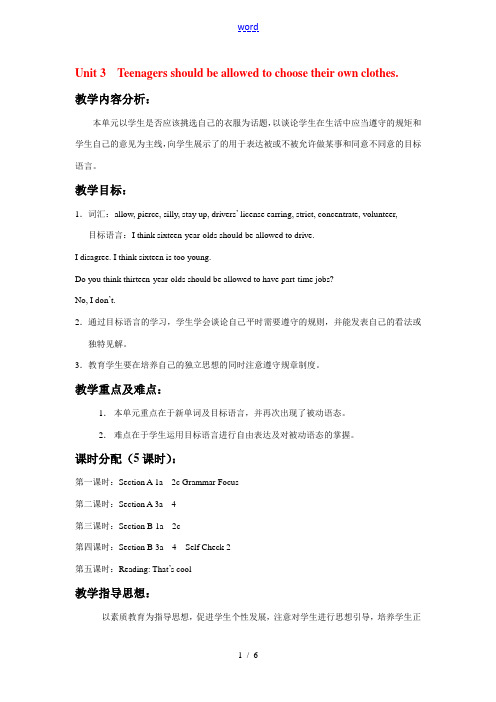
Unit 3 Teenagers should be allowed to choose their own clothes.教学内容分析:本单元以学生是否应该挑选自己的衣服为话题,以谈论学生在生活中应当遵守的规矩和学生自己的意见为主线,向学生展示了的用于表达被或不被允许做某事和同意不同意的目标语言。
教学目标:1.词汇:allow, pierce, silly, stay up, drivers’ license earring, strict, concentrate, volunteer, 目标语言:I think sixteen-year-olds should be allowed to drive.I disagree. I think sixteen is too young.Do you think thirteen-year-olds should be allowed to have part-time jobs?No, I don’t.2.通过目标语言的学习,学生学会谈论自己平时需要遵守的规则,并能发表自己的看法或独特见解。
3.教育学生要在培养自己的独立思想的同时注意遵守规章制度。
教学重点及难点:1.本单元重点在于新单词及目标语言,并再次出现了被动语态。
2.难点在于学生运用目标语言进行自由表达及对被动语态的掌握。
课时分配(5课时):第一课时:Section A 1a---2c Grammar Focus第二课时:Section A 3a---4第三课时:Section B 1a---2c第四课时:Section B 3a---4 Self Check 2第五课时:Reading: That’s cool教学指导思想:以素质教育为指导思想,促进学生个性发展,注意对学生进行思想引导,培养学生正确认识个性及美丑。
教学方法:听说读写相结合,循序渐进;设计合理并具有挑战性任务,让学生在完成任务时练习使用目标语言,体验成功之快乐教学过程设计:Period OneStep 1 Greeting and a small talkThe S on duty gives a small talk on her unpleasant shopping(her mother didn’t let her choose her own clothes) to lead in the topic of Unit 3 “Teenagers should be allowed to choose their own clothes”Then, Ss show their own opinion by saying “agree” and “disagree”Step 2 Do you agree or disagree1a Read the statements in the textbook. Circle A or DStep 3 Pairwork 1cGet students to tell out their “agrees”and“disagrees”,as well as their reasons, to their partners. T moves around to give help if necessary.Step 4 Listening practice1b Get Ss to look at the picture and tell them they are going to hear a conversation between Anna and her mother. Listen and circle T of F (for the first time, Ss only listen.) Then check the answers: F, F, T2a-2b Do the same with them as 1bStep 5 Pairwork 2cFirst get Ss to list out teenagers should and should not be allowed to do. Then discuss their lists with their partners using the short conversation in the right box.Step 6 Task1:Get Ss to list out what they are and are not allowed to do and make ments about them. (to get Ss practice talking about their real experience and feelings with the target language) Step 7 Grammar focusGet Ss first to read out the statements and then give out their own opinions to replace the statements in the right column.Step 8 Summary and homework:What rules do you have at home? Make a list of them.Period TwoStep 1 GreetingGreet the class and check the homeworkStep 2 A duty reportThe S on duty gives a report on the rules in his home and lead in 3a“Sun Fei’s and Wu Y u’s rules”Step 3 ReadingSs read the conversation and write the two girls’ rules in the chart.Check the answers.Get Ss to read after the tape and then read aloud by themselves.Then, T explains the language points.Step 4 Pairwork 3bRole play. Use the information in chart to practice with the conversation in 3a covered. They can look at the sample conversation in the right box.Step 5 Task 2 “Who’s the best reporter?”Make a survey by asking any 5 students the questions in the chart in activity 4. Then give out a report about it. See who is the best reporter? And the best reporter will get a nice ball-pen. Step 6 Summary and homework:Write out the report in your exercise-books.Period ThreeStep 1 Greeting and a duty reportThe S gives a duty report talking about his experience of being late for school. Lead in the question “Do you ever get to school late? How often do you get to school late? Always, usually, sometimes, or never?Step 2 1a Get Ss to finish writing.Step 3 Pairwork 1bGet Ss to talk about their answers with their partners using the sample conversation in the box on the right.Step 4 Listening practice2a Lead-in: What will happen if you get to school late? What about Peter? Let’s listen to a conversation between Peter and his father. Get Ss to finish 2a (As usual, for the first time, Ss only listen.) Check the answers.2b Listen again, match these sentences parts. Check the answers.Step 5 Groupwork 2cSs discuss the statements with their group members to practice oral English.Step 6 Task 3:A debateChoose one statement (No.3 Parents should not be too strict with teenagers.) as the topic for them to debate. Those who agree sit on one side, those who disagree sit on the other side.Before starting, each group have 2 minutes to get prepared. See which group is the winner.While debating, Ss should write down the opinions they hear for their homework. Step 7 Summary and homeworkWrite an article about your own opinions to the topic debated in class.Period FourStep 1 GreetingGreet the class as usual and check the homework. Get two students to read out their articles to the class.Step 2 ReadingLeading-in: Everyone of you has your own thought. Let’s read an article written by a teenagers like you. While reading, please try to find out the answers to the questions below.Check the answers.T plays the tape for Ss to listen and repeat. Then get them to read it out loudly.T explains some language points.Step 3 Pairwork 3bRole play. Use the information in 3a to have a conversation like the sample conversation in the box.Step 4 Task 4 The best opinion“What school rules do you think should be changed in our school?” Get Ss to discuss with their partners and then write down what both of them think should be changed on the paper given by T. Later, discuss those statements on the paper with the whole class and tell them to give the best one to the headmaster as good advice.Step 5 Task 5 4Suppose: you and your partner are starting a new Saturday English club. Discuss with him.Make a list of rules about what should and should not be allowed.Step 6 Writing practiceSelf Check Ex.2 get Ss to read the article and then practice writing a letter using the target language.Step 7 Summary and homeworkFinish Ex.1 in Self Check.Period FiveReading---That’s cool.Step 1 Warming-upAsk: What does the word “cool” mean to you? Give some examples. Ss talk about their own opinions freely.Step 2 While-readingGo through the reading and match the people with their opinions in 2 on page 24 and plete the sentences in 4 on page 25.Step 3 Deep prehensionSs read the article more carefully. Try to guess the meanings of the new words. And match the words and expressions with their meanings in 3 on page 25. Then get Ss to make sentences with them.Step 4 Groupwork 5Get Ss to finish the groupwork in 5 on page 25 by asking their group members.Step 5 Summary and homeworkWrite a report about what your classmates think about “cool”.。
- 1、下载文档前请自行甄别文档内容的完整性,平台不提供额外的编辑、内容补充、找答案等附加服务。
- 2、"仅部分预览"的文档,不可在线预览部分如存在完整性等问题,可反馈申请退款(可完整预览的文档不适用该条件!)。
- 3、如文档侵犯您的权益,请联系客服反馈,我们会尽快为您处理(人工客服工作时间:9:00-18:30)。
Unit 3一、单项选择。
1. _______ should be allowed to play with their friends.A. Sixteen year oldsB. Sixteen-years-oldC. Sixteen-year-oldsD. Sixteen-year-old2. They are not ________ to go to school.A. enough oldB. old enoughC. too oldD. old too3. We are not allowed to go to the movies __________ school nights.A. inB. onC. atD. of4. I must get the breakfast __________.A. cookB. to cookC. cookedD. cooking5. The music sounds _________.A. goodB. wellC. nicelyD. beautifully6. Father is very strict _________ us children.A. toB. atC. inD. with7. She studied hard and at last she _________ the test.A. pastB. passedC. passD. was past8. ---I don’t care what other people think about it. ---_________.A. So do IB. Nor don’t IC. Neither do ID. So I do9. Something is wrong with my TV set. I would like to get it _______.A. to repairB. repairedC. repairingD. repair10. Do you think John is a _________ boy?A. careful enoughB. carefully enoughC. enough carefulD. enough carefully11. I have an _________ daughter. She is very good at .A. 11 years oldB. 11-years oldC. 11-year-oldD. 11-years-old12. The students shouldn't get ________ ears pierced.A. themB. theirC. theirsD. they13. School will allow _______ in the classroom tonight.A. singB. to singC. singingD. sings14. Tom often thinks ________ talking.A. insteadB. in placeC. instead ofD. instead to15. Jenny disagrees ________ her mother.A. toB. forC. withD. in16. They aren’t ________ at that age.A. serious enoughB. enough seriousC. enough oldD. enough wild17. The young should be ________ their own culture.A. proudB. proud ofC. proud toD. prouded18. Our teacher is very strict ________ us and he is also very strict _________ his work.A. in; withB. with; inC. for; inD. in; for19. I think some of our school rules should ________, they have been outdated.A. changeB. changedC. be changedD. changes20. The young trees _______ down.A. should not be cutB. should be not cutC. not should be cutD. should not be cutting二、句型转换。
1. We allow you to use the computers. ( 改为被动语态)You ________ ________ to use the computers.2. Jack seems to be angry with me. ( 改为否定句)Jack ________ ________ to be angry with me.3. I like talking with my friends. I don't like writing to them. ( 合并成一句)I like talking with my friends _________ _________ writing to them.4. Bruce does everything carefully. ( 改为感叹句)________ ________ Bruce does everything!5. Do it and you’ll soon feel much healthier. ( 改为条件状语从句)________ ________ do it, you’ll soon feel much healthier.三、根据汉语提示完成句子。
1. ________ ( 十六岁大的孩子) should be allowed to drive.2. Ann ________ _________ ________ ( 被允许) choose her own clothes.3. They talk ________ ________ ________ ________ ________ ( 取代做作业).4. To have a good health, we must get up and go to sleep early. Don’t ________ _________. ( 熬夜)5. He _______ _______ _______ ( 对…严格) his students.6. _______ ________ ( 目前) they’re too short.7. We should ________ _______ ( 向…学习) each other.8. The young man ________ _______ ( 看上去时髦), but he isn’t kind to the old man.9. I don’t think fifteen-year-olds should be allowed to ________ ________ ________ __________________ ( 扎耳朵眼).10. As a student, we must obey _________ _________ ( 严格的规章制度).四、词形转换。
1. succeed ( 形容词)________2. sleep ( 形容词)________3. stop ( 现在分词)_________4. agree ( 名词)__________5. wear ( 同音词)___________6. little ( 最高级)__________7. fashion ( 形容词)_________ 8. perform ( 名词)_________9. six-year-old ( 复数)_________________10. comfortable ( 比较级)______________五、补全对话。
A: I have a lot of 1 at home.B: 2 do I. For example, I cannot go out on school nights. And I have to get up before seven o’clock in the morning.A: I usually do, too. But sometimes I’m 3 to go to the movies with my friends on Saturday nights.B: Me, too. But I have to get home before 10:00 pm.A: 4 Sunday morning, I can fish with my friends.B: That’s great! But I have to go to the 5 to study.A: I have to go to the library, too. But it’s on Sunday afternoon.1.________2. ________3. ________4. ________5. ________参考答案一、1. C 2. B 3. B 4. C5. A6. D7. B8. C9. B 10. A 11. C 12. B13. C 14. C 15. C 16. A17. B 18. B 19. C 20. A二、1. are allowed 2. doesn’t seem 3. instead of4. How carefully5. If you三、1. Sixteen-year-olds 2. is allowed to3. instead of doing their homework4. stay up5. is strict with6. At present7. learn from 8. looks fashionable9. get their ears pierced 10. strict rules四、1. successful 2. sleepy 3. stopping 4. agreement5. where6. least7. fashionable8. performance 9. six-year-olds 10.more comfortable五、1. rules 2. So 3. allowed 4. On 5. library。
